How long raw eggs can be stored in the refrigerator, methods and conditions, how to prolong
Raw eggs are foods that require certain storage conditions. How long raw eggs can be stored in a refrigerator or other location depends on the freshness and temperature conditions.
Content
- 1 How to check the freshness of eggs
- 2 Factors Affecting Egg Storage
- 3 Where is the best place to store eggs
- 4 How to properly store eggs in the refrigerator, what purpose?
- 5 Shelf life allowed in the refrigerator
- 6 How much and how to store without a refrigerator
- 7 Table of temperature regimes
- 8 Which eggs last longer?
- 9 How to extend the shelf life of a product
How to check the freshness of eggs
There are several ways to determine the relevance of a product. Including:
- Before buying, you should pay attention to the appearance. Fresh eggs have a matte surface that becomes glossier over time.
- Soak the product in a container of water. Spoiled specimens will remain on the surface of the liquid.
- By the smell of shellfish. The smell of lime indicates freshness and high quality.
Factors Affecting Egg Storage
Fresh eggs retain their flavor profile depending on several environmental factors.If they are stored at home, it is necessary to ensure that the optimum temperature does not exceed 20 degrees, the humidity indicator up to 80% and the minimum penetration of light on the shell.
Where is the best place to store eggs
The most suitable storage place is the refrigerator. Constant exposure to low temperatures preserves the quality of the product and prevents the growth of bacteria under the shell.
How to properly store eggs in the refrigerator, what purpose?
Depending on which side to place the product inside the refrigerator, it is possible to slightly extend the shelf life. For long-term storage, the pointed end should be pointing down. This will make the content more static. In addition, there is an air gap on the opposite side, which is not blocked by anything.
Shelf life allowed in the refrigerator
How long eggs can be stored depends on the environment. If all the manufacturer's recommendations are followed, the maximum shelf life reaches 45 days.
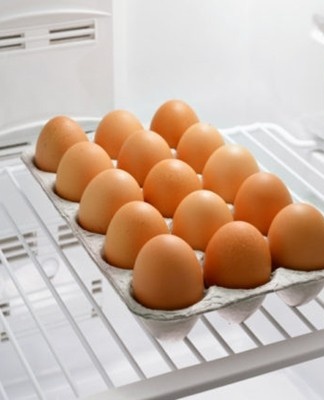
For raw eggs
Storing raw foods in the refrigerator has several characteristics. The most useful are diet eggs, which can be stored for no more than a day to get the maximum amount of nutrients. Ultimately, the product is considered a table product and can be consumed with minimal heat treatment for the next 25 days.
In the future, eggs can be stored for up to 45 days and eaten only if hard-boiled in their shells.
For hard-boiled eggs
Hard-boiled eggs should not be left in the refrigerator for long. It is recommended to use the finished product no later than 5 days later.
hard to boil
Hard-boiled eggs can also be stored in the refrigerator, but the appropriate temperature should vary between 2 and 4 degrees. Immediately after cooking, it is recommended to place the food in a cool liquid, then transfer it to a tightly closed plastic container . Such preservation measures will prevent the absorption of foreign odors, because the porous shell has the property of absorbing surrounding odors. Shelf life under the conditions listed is 2 weeks.
Boiled
In the case of cooking soft products, the heat treatment does not exceed 3 minutes. The preparation method assumes that the yolk remains in a liquid state, which affects the shelf life. The maximum shelf life is 48 hours, after which there is a high risk of poisoning if consumed.
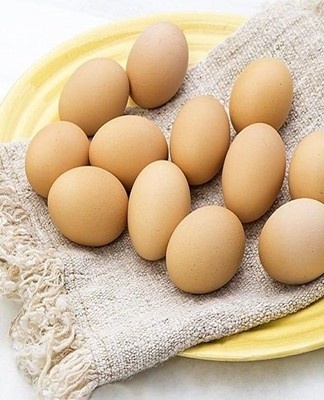
Shelf life of broken eggs
Damage to the integrity of the casing negatively affects shelf life and, over time, leads to product spoilage. Prepare broken specimens as soon as possible. It is recommended not to keep them for more than 48 hours in a sealed container.
Shelf life and freezer storage conditions
When stored in a freezer, the shelf life is longer than in the refrigerator. In order for the product not to lose its taste and consistency, you need to follow a simple instruction:
- Break the eggs into a bowl. As the contents expand during freezing, storage with the shell in the freezer is not recommended.
- Stir the white and yolk until smooth. It is important that a minimum amount of air enters the resulting mass.
- Add salt to the mixture so that no grainy texture forms after defrosting.
- Beat the mixture again. If a more homogeneous mass is required, you can pass it through a sieve.
- Pour the mixture into a clean container and leave in the freezer. Since the eggs may overflow from the edge of the container due to the increase in volume due to the influence of cold, a margin of 1-2 cm should be left.
Storage time under these conditions can be up to one year. For convenience, it is recommended to indicate on the container the date of placement and the number of eggs in the container.
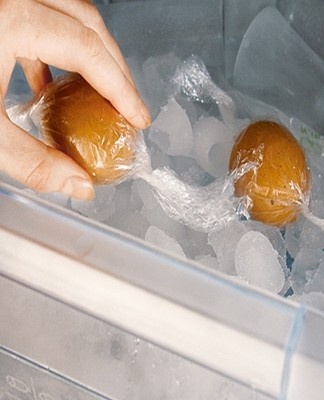
How much and how to store without a refrigerator
If it is not possible to leave the product in the refrigerator, it can be stored at home for 2-3 weeks. A suitable room temperature should be between 0 and 10 degrees. Storage is not allowed at room temperature.
Eggs can be laid out in wooden crates, boxes or pallets in several layers. To soften and prevent breakage, it is recommended to place chips, peat, dried grains or ashes at the bottom of the container.
Table of temperature regimes
To systematize information about storage features, you should familiarize yourself with a visual board. Depending on the condition of the product, a distinction is made between the following recommended temperature conditions:
- cool - up to 20 degrees;
- hard - 2-4 degrees;
- boiled - room temperature;
- at a boil - 18-20 degrees.
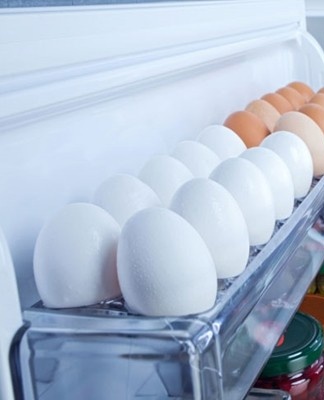
Which eggs last longer?
For long-term storage, the eggs are exceptionally fresh, freshly harvested in cool conditions with a strong shell, on which there are no potholes or small cracks. When collecting the product, markings are left with a simple pencil, indicating the date for later tracking of the expiration date. The shell is not washed and is covered with lard or melted fat to protect it from external influences.
Fresh prepared eggs are left in a room with a stable temperature over the winter. In this case, it is important to exclude freezing. In order for the product to be stored for a long time, the room should be dark. Alternatively, drawers or boxes can be closed tightly to further restrict air access and maintain freshness.
Quail and chicken - is there a difference?
Quail eggs are considered the most common after chicken eggs.This variety has individual properties, is characterized by small size and weight. A characteristic external feature is an interspersed monochrome color. Quail products are often used for cooking and making exquisite haute cuisine sauces.
The relatively small size negatively affects long-term storage properties. It is not recommended to consume the product raw and semi-cooked after 10 days of storage.
Some varieties may not lose their taste and quality within a month, provided they are refrigerated.
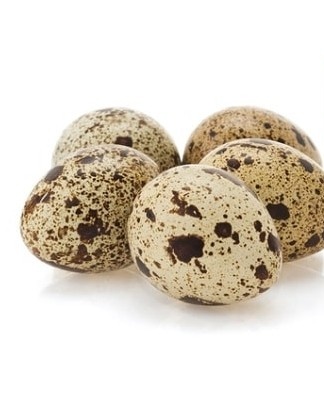
How to extend the shelf life of a product
There are several ways to extend the shelf life. The most common are:
- Treatment of the shell with melted beeswax. After covering the shell with wax, it is necessary to wait until it is completely solidified, lay the pointed end and keep it at a stable temperature of 5-10 degrees. The wax fills the microscopic pores in the shell and keeps air and bacteria out.
- Grease coating. By analogy with depilation, it is enough to apply a layer of fat over the entire surface of the shell. It is recommended to use pork fat because its melting point is lower than the point at which protein coagulation occurs.
- Hull disinfection. By keeping the product in a solution of potassium permanganate and treating the surface with sunflower oil, it is possible to get rid of accumulated microorganisms and extend the shelf life.
- Unfold in containers in several layers, sprinkle with table salt. The properties of salt provide protection against external influences.



